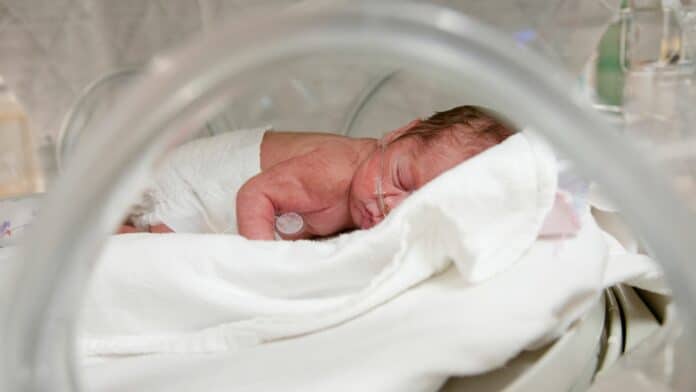Habituation to recurrent non-threatening or unavoidable noxious stimuli is essential to adaptation to pain. Neonates, especially if preterm, are exposed to repeated noxious procedures during their clinical care. They can mount strong behavioral, autonomic, spinal, and cortical responses to a single noxious stimulus; however, it is not known whether the developing nervous system can adapt to the recurrence of these inputs.
A new study by UCL researchers investigated changes in cortical microstates (representing the complex sequential processing of noxious inputs) following two consecutive clinically required heel lances in term and preterm infants. Researchers found that preterm infants do not get used to repeated pain like full-term infants, children, and adults habituated to pain.
Lead author Dr. Lorenzo Fabrizi (UCL Neuroscience, Physiology & Pharmacology) said: “The way that we can get used to things can be seen as the simplest example of behavioral and brain plasticity, and it is a basic part of memory and learning. Pain habituation is crucial because it enables us to preserve physical, emotional, and cognitive resources by not overreacting to unavoidable or life-threatening pain.”
“Our findings suggest that the ability to get used to repeated pain might develop during the third trimester of pregnancy so that babies born prematurely have not yet developed this ability that full-term babies have right from birth.”
For this study, scientists studied cortical network engagement and switching on a sub-second timescale by performing microstate analysis on multichannel electroencephalography (EEG) recordings. Following a noxious stimulus, they characterized the pattern of time-varying cortical potentials measured across the scalp.
The study involved 20 infants. Half were preterm, whereas the other half were either born at full term (seven infants) or preterm but tested at term age. The two groups were comparable in terms of their actual postnatal age, as the preterm babies had a median age of 14 days, compared to 10 days among the full-term (or term age) group.
Each newborn underwent a painful but clinically necessary heel lance (blood test) twice, three to 18 minutes apart, to measure the infants’ reactions (two lances are sometimes required to collect enough blood; this is not needed for most infants, so only those that needed a second lance were included in the study).
Infants’ pain reactions to heel lances can be rather severe, but it wasn’t previously known whether this would get better with more lances. The researchers observed the infants’ facial expressions and leg-withdrawal reflexes while recording their brain activity using electrodes for electroencephalography (EEG) and their heart rates using electrocardiography (ECG).
Researchers noticed the brain activity was less strong after the second heel lance compared to the first. This suggests a habituation response. However, this was the case for full-term infants. They found a similar pattern for heart rate and facial expressions, as preterm infants reacted just as strongly to both heel lances, while the full-term infants appeared to habituate to the pain.
Researchers noted, “This habituation response might be due to the full-term infants anticipating the imminent pain when they receive a second heel lance, so their reaction is less pronounced, or it may instead or additionally be due to their brains modulating their reflexive survival responses.”
“Habituation to pain might protect the full-term infants, but not those pre-term, from potential consequences to their development.”
First author Dr. Mohammed Rupawala (UCL Neuroscience, Physiology & Pharmacology) said: “While unpleasant and painful clinical procedures are necessary for many young infants, there is the potential to impact their development, such as by altered pain perception, or potentially reduced grey matter or disrupted white matter in the brain.”
Co-author Dr. Judith Meek, consultant neonatologist at UCLH, said: “This work raises awareness of the extra vulnerability of premature babies to pain. Clinicians need to do their best to protect them from repeated painful experiences. This should be regarded as an essential component of brain-oriented newborn care.”
Journal Reference:
- Mohammed Rupawala, Oana Bucsea, et al. A developmental shift in habituation to pain in human neonates. Current Biology. DOI: 10.1016/j.cub.2023.02.071
